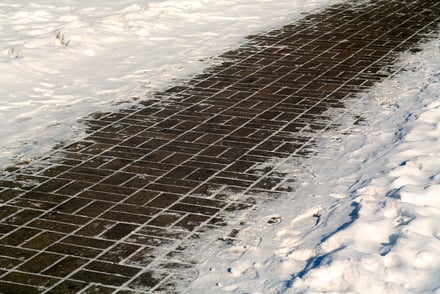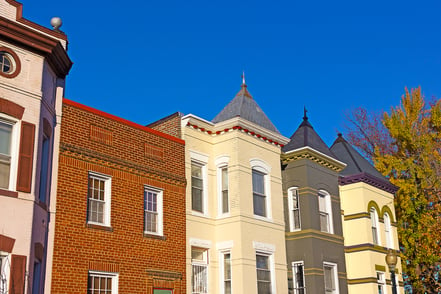The exposed mortar in many old brick Washington DC chimneys is particularly vulnerable to weather damage. The right mortar joints can last for 25 years or more, but are greatly affected by the weather. If your historic home has a brick chimney, it may need to be repaired before the winter weather hits.
How Does Weather Damage Brick and Mortar?
Winter is known for changes in temperature. One day rain mixes with wind to become sleet and then, snow. The next day presents as crisp and sunny. These weather changes slowly destroy your masonry joints. Moisture is absorbed into brick and mortar, and with the temperature fluctuations the water expands and contracts. If brick and mortar were equally strong, this thermal expansion would damage both brick and mortar. Instead, mortar is softer than brick. Years of changing temperatures cause enough moisture damage to require repair or tuckpointing the mortar.
How Can I Tell if My Chimney is in Bad Shape?
If you have a working chimney that is inspected and/or cleaned on a regular basis, your contractor will test the mortar joints as part of the inspection. If you have a decorative chimney and prefer a DIY approach, you can visually inspect the exposed area and look for signs of failing or missing mortar joints between the bricks. You may need to follow up by performing a probing test with a small knife. If mortar is loose, crumbling, or falls out easily with digging, it is in need of repair or restoration.
What Are My Options for Brick Chimney Repair?
Brick chimney repair in historic buildings - generally those that were build before World War II - generally depends on the condition of the bricks. A process known as tuckpointing brick, or repointing, involves removing and replacing some of the old mortar with lime-based mortar. Some chimneys require repair and replacement of loosened and damaged bricks. In severe cases the entire structure might need replacement.
Why Do You Have to Use Lime Mortar?
Washington DC brick homes built in the 18th, 19th and early 20th centuries were constructed of clay coal-fired bricks assembled with lime mortar. Lime mortar is completely different from cement or concrete in both composition structure and level of hardness/softness. The modern building materials are best suited for new construction, not renovation of historic masonry structures. Traditional masonry materials and tuckpointing methods used in brick chimney repair will ensure continuing structural integrity for decades to come.
Renaissance Development, a leader in old brick restoration and historic preservation, is a specialist in Washington DC brick chimney repair. If your old brick chimney has loose and crumbling mortar, contact us.
Tags:
RepairMar 28, 2017 8:30:00 AM



